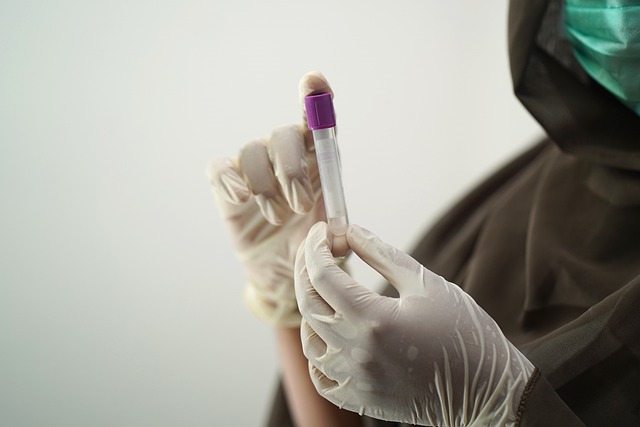The Advanced Thyroid Blood Test UK is a critical diagnostic tool for assessing thyroid health in the UK. It measures key hormones TSH, FT4, and FT3, with TSH guiding thyroid function, while FT4 and FT3 indicate the presence of active thyroid hormones. This test enables healthcare providers to diagnose and manage thyroid disorders including hypothyroidism, hyperthyroidism, and thyroid cancer, as well as detect autoimmune diseases like Hashimoto's thyroiditis and Graves' disease through antibody levels. The comprehensive results of this test are essential for accurate diagnosis, personalized treatment plans, and better patient care outcomes. Clinicians should interpret these results alongside other diagnostic data and patient histories to make informed decisions about thyroid disorders. It is also important for clinicians to use comprehensive clinical judgment when interpreting the test results, considering factors like age, sex, medical history, and reported symptoms, as well as the impact of medications such as amiodarone. In cases where diagnosis is uncertain or for monitoring existing conditions, repeat testing may be necessary. Additionally, TRAb markers are valuable in diagnosing autoimmune thyroid conditions or when thyroiditis is suspected. By integrating these clinical factors, healthcare professionals can significantly improve diagnostic precision and patient care, ensuring effective treatment utilizing the Advanced Thyroid Blood Test UK within the UK's healthcare framework.
When assessing thyroid health, medical professionals turn to advanced thyroid blood tests, a cornerstone in the UK’s diagnostic arsenal. This article delves into the intricacies of these tests, focusing on the pivotal components—TSH, Free T4, and Free T3 levels—that provide critical insights into thyroid function. We will navigate through interpreting these results to guide effective patient management for thyroid disorders. Understanding the nuances of an Advanced Thyroid Blood Test in the UK is essential for accurate diagnosis and treatment planning, ensuring better outcomes for patients.
- Understanding the Components of an Advanced Thyroid Blood Test in the UK
- Interpreting Results: The Role of TSH, Free T4, and Free T3 Levels
- Clinical Considerations and Patient Management for Thyroid Disorders Post-Test
Understanding the Components of an Advanced Thyroid Blood Test in the UK

In the UK, the assessment of thyroid function is a critical component in the management of thyroid disorders. An Advanced Thyroid Blood Test plays an integral role in this process, providing a comprehensive overview of thyroid hormone levels and related parameters. This test typically includes measurements of thyroid-stimulating hormone (TSH), free thyroxine (FT4), and free triiodothyronine (FT3). TSH is a pituitary hormone that regulates thyroid function; abnormalities in its levels are often indicative of thyroid dysfunction. FT4 and FT3, on the other hand, reflect the amount of active thyroid hormones in the bloodstream. These measurements, when combined, offer a detailed picture of thyroid status, enabling medical professionals to diagnose and monitor conditions such as hypothyroidism, hyperthyroidism, or thyroid cancer effectively. Additionally, the test may also include antibody levels to detect autoimmune thyroid diseases like Hashimoto’s thyroiditis or Graves’ disease, which are common in the UK population. The Advanced Thyroid Blood Test UK is a vital tool for accurate diagnosis and personalized treatment plans, ensuring optimal patient care and outcomes. Medical professionals must interpret these results within the clinical context of patient presentation, considering other tests and medical history to arrive at an informed diagnosis and treatment decision.
Interpreting Results: The Role of TSH, Free T4, and Free T3 Levels

When interpreting thyroid function tests, medical professionals rely on a panel that typically includes assessing Thyroid-Stimulating Hormone (TSH), Free Thyroxine (FT4), and Free Triiodothyronine (FT3) levels. The TSH, produced by the pituitary gland, is a pivotal indicator of thyroid function, as it reflects the body’s need for thyroid hormones. Elevated or suppressed levels of TSH can suggest hyperthyroidism or hypothyroidism, respectively. In conjunction with TSH, FT4 and FT3 measurements are indispensable for a comprehensive evaluation of thyroid status. These tests measure the amount of active thyroid hormones in the bloodstream, providing a clearer picture of the thyroid’s production rates. The Advanced Thyroid Blood Test UK encompasses these hormone assessments, offering a nuanced understanding of thyroid function. This test is instrumental in early diagnosis and management of thyroid disorders, which is crucial for patient care and health outcomes. Medical professionals utilize these results to tailor treatment plans, ensuring patients receive the most effective therapy. It is through this meticulous interpretation that the clinical picture becomes more defined, allowing for precise interventions and support for individuals with thyroid dysfunction. Understanding the interplay between TSH, FT4, and FT3 levels is a cornerstone of endocrinology, demonstrating the importance of advanced thyroid testing in the UK’s healthcare system.
Clinical Considerations and Patient Management for Thyroid Disorders Post-Test

When interpreting results from an advanced thyroid blood test in the UK for patients with suspected thyroid disorders, clinical considerations are paramount for effective patient management. Thyroid function tests, including TSH (thyroid-stimulating hormone), Free T4, and sometimes Free T3, provide a comprehensive evaluation of thyroid status. Clinicians must take into account the patient’s age, sex, medication history, comorbidities such as diabetes or heart disease, and symptoms reported. For instance, subtle changes in thyroid hormone levels can be more significant in the elderly, and women are generally more sensitive to thyroid hormones than men. Additionally, certain medications, notably those affecting liver enzymes like amiodarone, can affect thyroid test results, necessitating careful consideration of the patient’s medication list.
In managing patients post-thyroid blood test, healthcare professionals must individualize treatment plans based on the patient’s unique clinical picture. A confirmatory retest may be required if initial results are borderline or if there is a high index of clinical suspicion despite normal values. It is also crucial to monitor thyroid hormone levels regularly in patients with known thyroid disorders, as they may require adjustments to their medication over time. Furthermore, the integration of additional markers such as TRAb (thyrotropin receptor antibodies) can be valuable in cases of autoimmune thyroid disease or when there is a suspicion of thyroiditis. By combining these clinical insights with the results from an advanced thyroid blood test UK, medical professionals can enhance the accuracy of diagnosis and optimize patient care for those with thyroid disorders.
In conclusion, the advanced thyroid blood test remains a cornerstone in the diagnosis and management of thyroid disorders within the UK healthcare system. By comprehending the nuances of TSH, Free T4, and Free T3 levels, medical professionals can effectively interpret results, leading to precise clinical decisions. The intricacies of thyroid function testing underscore the need for a thoughtful approach to patient management post-test. For healthcare providers navigating the UK’s healthcare landscape, staying abreast of the latest developments in thyroid assessment is essential for delivering optimal patient care. The Advanced Thyroid Blood Test UK stands as a testament to the ongoing advancements in diagnostic medicine, facilitating more accurate diagnoses and personalized treatment plans for individuals with thyroid concerns.
